I'll check what resistors I have in the morning, but if I don't have a 100ohm resistor, would it be better to go slightly higher or lower? and I did have a potentiometer if I can't find anything
Be careful not to go too low. Clamp the FETs and watch the current draw while doing this.
If you have a pot, you can insert that in series with the 820 ohm resistor.
If you have a pot, you can insert that in series with the 820 ohm resistor.
The factory 820ohm resistor, about 1.61A of current draw, but when clamped they seem to heat up less than I remember, barely detectable temperature change in 1min of running.
Proceeding free air, With a potentiometer set to ~100ohm in series with the R175 820ohm resistor, current draw is 1.59A and heating is about the same as before
waveform looks like this:
source to gate (negative on source)
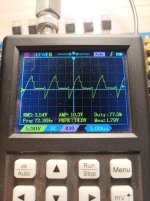
Proceeding free air, With a potentiometer set to ~100ohm in series with the R175 820ohm resistor, current draw is 1.59A and heating is about the same as before
waveform looks like this:
source to gate (negative on source)

From what you've posted, I think it's OK. Test thoroughly and make notes in case you get another one in for repair.
And should keep the 100ohm resistor right? Won't be able to do full power tests until it goes back in the car in an unknown amount of time, will report back later with how it does.
There was no significant change so the resistor probably make no difference. I'd probably go back with the original 820 ohm.
It is not ok, lasted about 10min in the car with a 100-200w load, now it tries powering up, shows power led for a second, immediately sends DC to the speaker terminals and goes into protect. input voltage solid around 14.2v. No output FETs are shorted (at least between gate and source, all have ~10k ohm between them)
Notes when playing:
Sine waves on terminals were good, but the output section was heating up more than I remember, I remember it being basically stone cold before.
After opening it up:
the PSU side transformer seemed a bit warm, I'd say 30-35c
one resistor near PSU side is burnt, R364
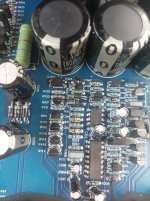
Notes when playing:
Sine waves on terminals were good, but the output section was heating up more than I remember, I remember it being basically stone cold before.
After opening it up:
the PSU side transformer seemed a bit warm, I'd say 30-35c
one resistor near PSU side is burnt, R364

Is that with the outputs out of the circuit?
You can test the drive with the rectifiers removed and the outputs in the circuit.
You can test the drive with the rectifiers removed and the outputs in the circuit.
This is with everything in the circuit, gonna get it back inside on the bench to do more proper testing, right now I'm just in the car with my tools 🙂
(video so can hear the ticking)
(video so can hear the ticking)
Removed rectifiers, there is nothing on any of the output section pins. The voltage regulators have ± voltages coming from them. 4580D on the driver card is slightly warm to the touch, some transistors aswell. The previously hot transistors on the driver board don't heat up
Increase the CCS resistor value and run it hard. Do the outputs still heat up?
Did you replace the Q124/125 drivers on the driver board?
These have been good in some of this type amplifier but you may need to try a different sub if the CCS change doesn't work. .
Did you replace the Q124/125 drivers on the driver board?
These have been good in some of this type amplifier but you may need to try a different sub if the CCS change doesn't work. .
Making sure, the CCS resistor is the R175 right? How high would be safe? right now it's 820ohm.
I redid the entire driver board with new transistors end of last year.
The subwoofer load should be fine, 4-8ohm after impedance rise, i don't have much else that could do a few hundred watts for testing.
I redid the entire driver board with new transistors end of last year.
The subwoofer load should be fine, 4-8ohm after impedance rise, i don't have much else that could do a few hundred watts for testing.
Do you have any IRF640s?
You can't do any harm going too high. If you go too high, there will either be some level of distortion or it will refuse to oscillate.
Has it ever worked right since the driver board had all of the transistors replaced?
If you only install one IRFB38N20D in each bank (and clamp them down) does that single transistor tend to get hot?
You can't do any harm going too high. If you go too high, there will either be some level of distortion or it will refuse to oscillate.
Has it ever worked right since the driver board had all of the transistors replaced?
If you only install one IRFB38N20D in each bank (and clamp them down) does that single transistor tend to get hot?
I don't have any IRF640s
Hasn't worked fully (today played perfect for the 10min, but with heating up then the new issue) since I redid the board, but I also switched the FETs from 31n20d to 38n20d.
gonna test a single 38n20d in the morning.
Just had an idea, could reinstall some of the 31n20ds for testing, I still have 9 seemingly fine ones, but multiple are mismatched batches (that's I why opted for the new FETs, 38n20d because of the cost and was told should be compatible). with the new transistor tester I will be able to pick 2 similar ones and test them as well.
Hasn't worked fully (today played perfect for the 10min, but with heating up then the new issue) since I redid the board, but I also switched the FETs from 31n20d to 38n20d.
gonna test a single 38n20d in the morning.
Just had an idea, could reinstall some of the 31n20ds for testing, I still have 9 seemingly fine ones, but multiple are mismatched batches (that's I why opted for the new FETs, 38n20d because of the cost and was told should be compatible). with the new transistor tester I will be able to pick 2 similar ones and test them as well.
Similar, compared to what?
I'm not a fan of 'shotgunning' boards. There are so many finicky class D amps that I prefer to only replace those known to be bad or possibly those known to fail. It's often better to get the amp working with as few changes as possibly (using as many parts that worked previously) then, if the tech wants to replace others, only do so in an amp that's known to be working perfectly.
Having matched parts is only really critical when the amp will be pushed to its limits.
I'm not a fan of 'shotgunning' boards. There are so many finicky class D amps that I prefer to only replace those known to be bad or possibly those known to fail. It's often better to get the amp working with as few changes as possibly (using as many parts that worked previously) then, if the tech wants to replace others, only do so in an amp that's known to be working perfectly.
Having matched parts is only really critical when the amp will be pushed to its limits.
Didn't test running a load with increased CCS, here's the source to gate waveform changing with increased CCS resistance
1040ohm:
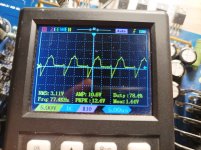
1120ohm:
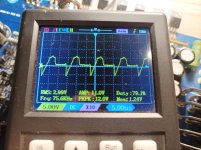
~1200ohm:
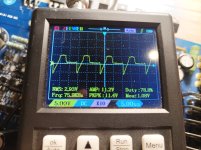
free air heating stayed about the same
Only running 1 FET per bank, CCS resistor 1026ohm:
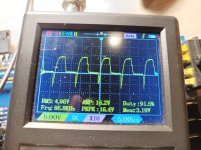
Current draw 1.5A, high side fet heats up quite fast relative to before, low side stays cool
Now will try 1 per bank of the 31n20d, will report back how it goes
1040ohm:

1120ohm:

~1200ohm:

free air heating stayed about the same
Only running 1 FET per bank, CCS resistor 1026ohm:

Current draw 1.5A, high side fet heats up quite fast relative to before, low side stays cool
Now will try 1 per bank of the 31n20d, will report back how it goes
Oh damn, I've noticed a weird behaviour.
sometimes the source to gate waveform looks like this
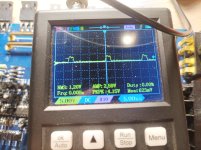
and it draws 1.12a, but if I touch the fet drain it goes up to 1.4a and looks like this, even when I'm no longer touching
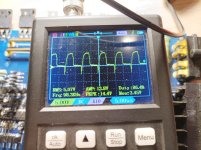
But that could that explain why it was heating up when clamped? There I'm not directly touching the fet to trigger this behaviour.
edit: touching the scope probe to drain also triggers it, even tho the scope is battery powered and negative isn't connected
sometimes the source to gate waveform looks like this

and it draws 1.12a, but if I touch the fet drain it goes up to 1.4a and looks like this, even when I'm no longer touching

But that could that explain why it was heating up when clamped? There I'm not directly touching the fet to trigger this behaviour.
edit: touching the scope probe to drain also triggers it, even tho the scope is battery powered and negative isn't connected
- Home
- General Interest
- Car Audio
- Ural Warhead 1.1800 repair and overall health check
